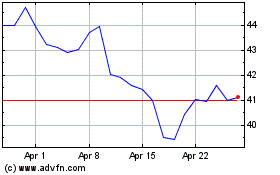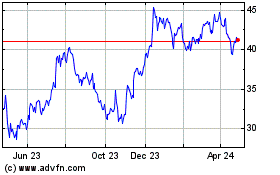By Yuka Hayashi
WASHINGTON -- Some banks want to take on payday lenders.
Financial firms, spurred by the Trump administration's promises
to deregulate, hope to return to offering short-term, high-interest
loans after being pushed out of the sector by Obama-era rules. Two
leading trade groups, the American Bankers Association and Consumer
Bankers Association, recently proposed to Treasury Secretary Steven
Mnuchin several steps they say would encourage banks to offer such
loans.
The groups call for scrapping 2013 guidelines that forced banks
to virtually abandon the market. Also on their wish list: blocking
the Consumer Financial Protection Bureau from rolling out the
sweeping rules on payday lending proposed last year, which they say
would hamper their return to the sector.
Letting banks and credit unions offer small loans, proponents
say, would help the millions of U.S. households that pay billions
of dollars in fees each year to payday and auto-title lenders that
often charge annual interest rates exceeding 300%.
"We feel very strongly that we want to serve all our customer
segments," said Mark Erhardt, senior vice president of retail
product management at Fifth Third Bancorp.
Fifth Third -- along with Wells Fargo & Co., Regions
Financial Corp. and U.S. Bancorp -- was among the large banks that
previously marketed so-called deposit advance loans, which allowed
their customers to borrow small amounts to weather cash crunches
between paychecks. Banks like Fifth Third believe small loans can
be profitable if they can offer them cheaply to a lot of
customers.
Still, don't expect banks to rush into the sector even if
regulation changes, owing to the loans' thin profit margins. "The
biggest hurdle to community banks making more small-dollar loans is
cost," said Joseph Gormley, assistant vice president of regulatory
policy at the Independent Community Bankers of America. "More or
less, it costs them the same amount to make a $500 loan as it does
a $20,000 loan."
The shifting political landscape has emboldened supporters of
payday-alternative loans. The prospects for the CFPB's payday-loan
rules have dimmed owing to Republican opposition to the bureau's
broad regulatory authority. Meanwhile, the Trump administration
recently appointed Keith Noreika, a private-sector banking lawyer,
as acting comptroller of the currency after removing Thomas Curry,
who had adopted the tougher standards for deposit advance loans in
2013.
"A new comptroller is a fresh start on this issue," said Nick
Bourke, director of consumer finance at Pew Charitable Trusts.
"Almost half of the households in this country who are living close
to edge financially can benefit from small credit from banks if
it's structured in a right way." Pew estimates 12 million Americans
take out payday loans each year, spending $9 billion on loan
fees.
A spokesman for the Office of the Comptroller of the Currency
said the agency's guidelines encourage banks to respond to
customers' short-term credit needs.
Banks all but withdrew from the market after the OCC and the
Federal Deposit Insurance Corp. imposed tougher loan standards to
limit banks' risk exposure and lower costs for consumers. Consumer
advocates had criticized the costs of these loans, which often
climbed into triple digits in terms of annual rates because of high
upfront fees.
Mr. Erhardt said that before the guidelines, such loans were
profitable for Fifth Third, which extended them to "several
hundreds of thousands" of customers at a flat fee of 10%. The loans
were typically for $300 and were repaid in two weeks, he said.
Terms offered by some payday loans could be similar if the loan
is paid back quickly -- but many consumers are unable to come up
with the money and take out new payday loans to cover old ones,
ending up in what consumer advocates call a debt trap.
Mr. Bourke said banks need a simple formula that allows them to
underwrite loans quickly and cheaply while making them safer for
borrowers, with features such as keeping payments lower than 5% of
the borrower's paycheck and allowing several months to repay. A
handful of banks and lenders' groups, including Fifth Third and
Regions, signed a comment letter late last year to push the CFPB to
support such a format. The CFPB is currently reviewing public
comments received on its proposed rules.
The Community Financial Services Association, a trade group of
payday lenders, said it would welcome banks to the market. "The
competition helps foster better industry practices and performance,
and...increased innovation," said the group's chief operating
officer, Charles Halloran.
Some credit unions continue to offer payday-alternative loans
but say the new CFPB rule, which requires lenders to assess
borrowers' ability to repay, might make the business line too
costly.
Wright-Patt Credit Union, an Ohio-based lender with 325,000
members, has 4,000 to 5,000 short-term loans outstanding at any
given time, for a total balance of $1 million to $2 million,
according to Chief Executive Doug Fecher. He said the loans allow
the credit union to "almost exactly break even," acceptable for a
nonprofit.
"Our goal as a credit union is to help these members who run out
of money and have nowhere else to turn," Mr. Fecher said. "We would
just like to be cheaper for them than it would be for them to go to
a payday lender."
Write to Yuka Hayashi at yuka.hayashi@wsj.com
(END) Dow Jones Newswires
May 20, 2017 09:04 ET (13:04 GMT)
Copyright (c) 2017 Dow Jones & Company, Inc.
US Bancorp (NYSE:USB)
Historical Stock Chart
From Mar 2024 to Apr 2024

US Bancorp (NYSE:USB)
Historical Stock Chart
From Apr 2023 to Apr 2024
